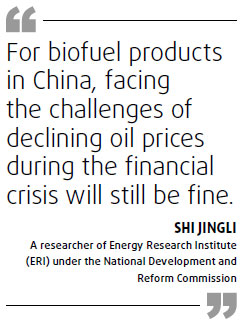

The outlook seems to be bittersweet for the renewable energy sector in China in 2009 and 2010.
The financial crisis may have a positive impact on the solar photovoltaic (PV) industry for seeking financing, but the growth tendency for the renewable energy sector will not change, industry insiders say.
"The financial crisis has a limited impact on China's green energy sector", says Li Junfeng, deputy director of Energy Research Institute (ERI) under the National Development and Reform Commission (NDRC). "The government will continue to support the renewable energy sector."
Last week, the NDRC just released a list of the subsidies for renewable energy projects.
It said more than 2 billion yuan of subsidies would be allocated to 148 renewable energy power generation projects from October 2007 to June 2008.
This list includes 102 wind power programs, 43 biomass power programs, and three solar energy power projects with overall installed capacity and on-grid electricity of 5.7 million kilowatt and 7.7 billion kilowatt hours.
In addition, 12 provincial power grid enterprises are allowed to introduce an additional electricity fee from their counterparts in other provinces through quota trading to make up fund shortages. The transaction volume will amount to 873 million yuan.

"This is the third time that the NDRC has released the subsidy notice since 2006, pushing electricity grid enterprises to pay the subsidies on time." says Shi Jingli, a researcher of ERI.
China introduced the Renewable Energy Law starting from January 1, 2006 and issued pricing mechanism on renewable energy power generation later to prompt the development of renewable energy sector.
But alternative power generating enterprises such as straw-fired power plant are always complaining the subsidies do not arrive on time.
Electrical grid enterprises are required to honor the subsidies and quota transactions within ten working days.
Shi says the NDRC was supposed to release the subsidy notice once a month, but it is difficult to conduct the plan because data is not easily collected from local regions.
She also says that industry insiders will suggest that the NDRC post a subsidy notice every three or six months.
"The financial crisis may affect the solar PV manufacturing industry because most of the enterprises in the field are depending on the overseas markets, and the share prices of these overseas listing companies has dropped dramatically, many over 80 percent, " says Li.
But the domestic renewable energy market outlook will still be bright, he says.
China's wind power industry is largely due to the government's strong push for sustainable development. According to the China Wind Power Report 2008 issued last week, the goal that China set to expand its wind power generation capacity to 10 gigawatt (GW) by 2010 will likely to be reached by the end of this year.
"China's target for wind energy is 30GW by 2020, but it might reach twice the target by then given the situation that China has laid out six 10GW wind farms which will be finished by 2020," says Shi.
Government action and private initiatives are pushing China's wind power market into a prominent position with major foreign companies also already present or looking to enter the market.
Netherlands-based clean energy company Econcern announced last week that it will partner with China National Offshore Oil Corp and Sinohydro to invest 863 million euros ($1.09 billion) to build four Chinese wind farms.
The construction of the wind farms, generating around 720 megawatts (MW) of renewable energy, will begin in 2009, it says.
For biofuel products in China, facing the challenges of declining oil prices during the financial crisis will still be fine, Shi says.
"This is because domestic prices of refined petroleum products are still controlled by the government, running off the international crude oil prices," Shi says.
And large biofuel manufacturers usually sign contracts with local governments to sell products at filling stations, she says.
But she also says while big biofuel producers can come through the bad times, smaller players will face the challenge due to the credit freeze.
(China Daily 12/08/2008 page5)













